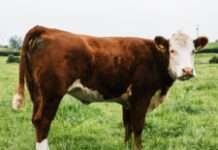Money does grow on trees
Harvesting black walnut seed provides opportunity to get outdoors and earn extra money
MANHATTAN, Kan. — Outdoor activities are almost limitless, and the cycles of nature provide a revolving door, constantly changing to create new and exciting opportunities throughout the year.
Dave Bruton, utilization and marketing forester with the Kansas Forest Service, says one of those opportunities is harvesting black walnut seed.
“Black walnut trees are commonly found throughout Kansas communities and woodlands, particularly in the eastern half of Kansas,” Bruton said. “They are great for personal use for making candies, breads, ice cream and holiday treats – but they also present an opportunity to make a little extra money.”
But Bruton understands that collecting black walnut seeds can be messy and hard work.
The juice found in the hull of walnuts stains hands. Stooping to collect nuts from the ground can also cause back stress. Bruton suggests using special tools designed to aid in harvesting black walnut.
“Two such products are the Nut Wizard and Bag-A-Nut,” he said. “Both work by rolling the respective equipment over the tops of the nuts scattered across the landscape so the tool can pick up the seed.”
Bruton said those products work most effectively in areas that are clear of sticks and debris, and where the vegetation is relatively short. While these and other products can readily be found online, they are also becoming more common in local hardware and other outdoor supply stores.
“If you gather more black walnuts than you want or need for your personal use, there is an opportunity to sell the excess,” Bruton said.
Bruton said that a Stockton, Missouri-based company — Hammons Products Co. — works with individuals across Kansas and ten other states, where black walnut trees are native, to establish hulling and buying stations.
This year, eight such stations are scattered across eastern Kansas. A map of the buying locations can be found on the Kansas Forest Service website under the tab, ‘Black Walnut Hulling Stations in Kansas.’
Bruton said the buying season runs from Oct. 1 to Nov. 2 with the price set at 0.16 per hulled pound. Individuals are not responsible for hulling, he said; that is performed at the buying station with equipment specially designed to quickly and efficiently handle large quantities of nuts.
“If you are looking for opportunities to get yourself or kids outside, consider gathering black walnuts and visiting a buying station near you,” Bruton said.
FOR PRINT PUBLICATIONS:b Links used in this story
Nut Wizard, www.nutwizard.com
Bag-A-Nut, https://baganut.com
Kansas Forest Service (nut and specialty products), www.kansasforests.org/forest_products/nutsandspecialtyproducts.html
About the Kansas Forest Service
The Kansas Forest Service is the nation’s fifth oldest state forestry agency. The agency serves rural landowners, communities, rural fire districts, forest and arboriculture industries, and citizens of the state through its Conservation Tree and Shrub Planting, Fire Management, Community Forestry, Rural Forestry, Marketing and Utilization, and Forest Health programs. The Kansas Forest Service state office is located in Manhattan, Kansas, just west of the campus of Kansas State University. The Kansas Forest Service is housed as an independent agency within K-State Research and Extension. The agency receives its direction from a mission statement that reads: “Care of natural resources and service to people through forestry.”
About K-State Research and Extension
K‑State Research and Extension is a short name for the Kansas State University Agricultural Experiment Station and Cooperative Extension Service, a program designed to generate and distribute useful knowledge for the well‑being of Kansans. Supported by county, state, federal and private funds, the program has county extension offices, experiment fields, area extension offices and regional research centers statewide. Its headquarters is on the K‑State campus in Manhattan. For more information, visit www.ksre.ksu.edu. K-State Research and Extension is an equal opportunity provider and employer.
For more information:
Dave Bruton
785-532-3300
Written by:
Cassie Wandersee




